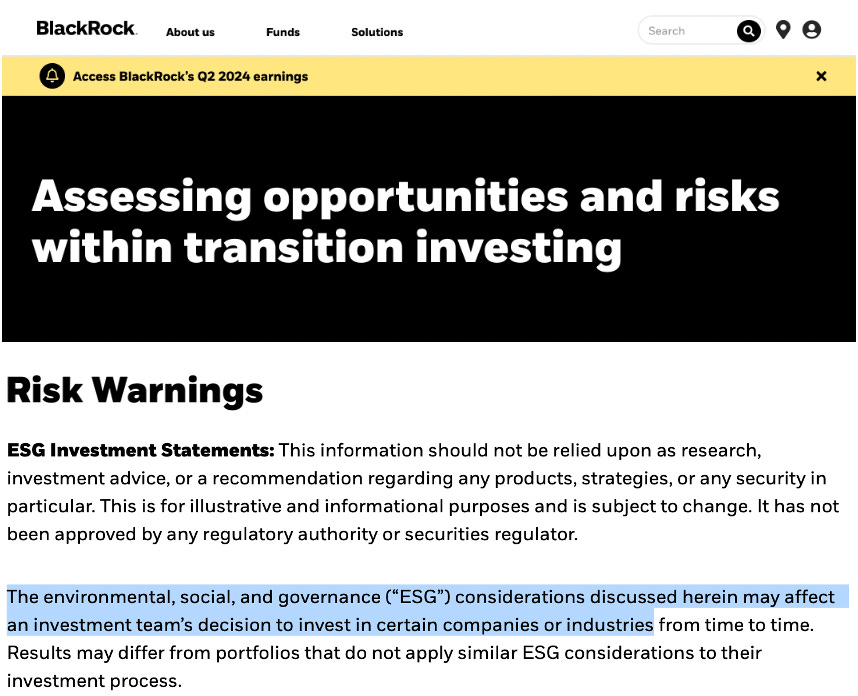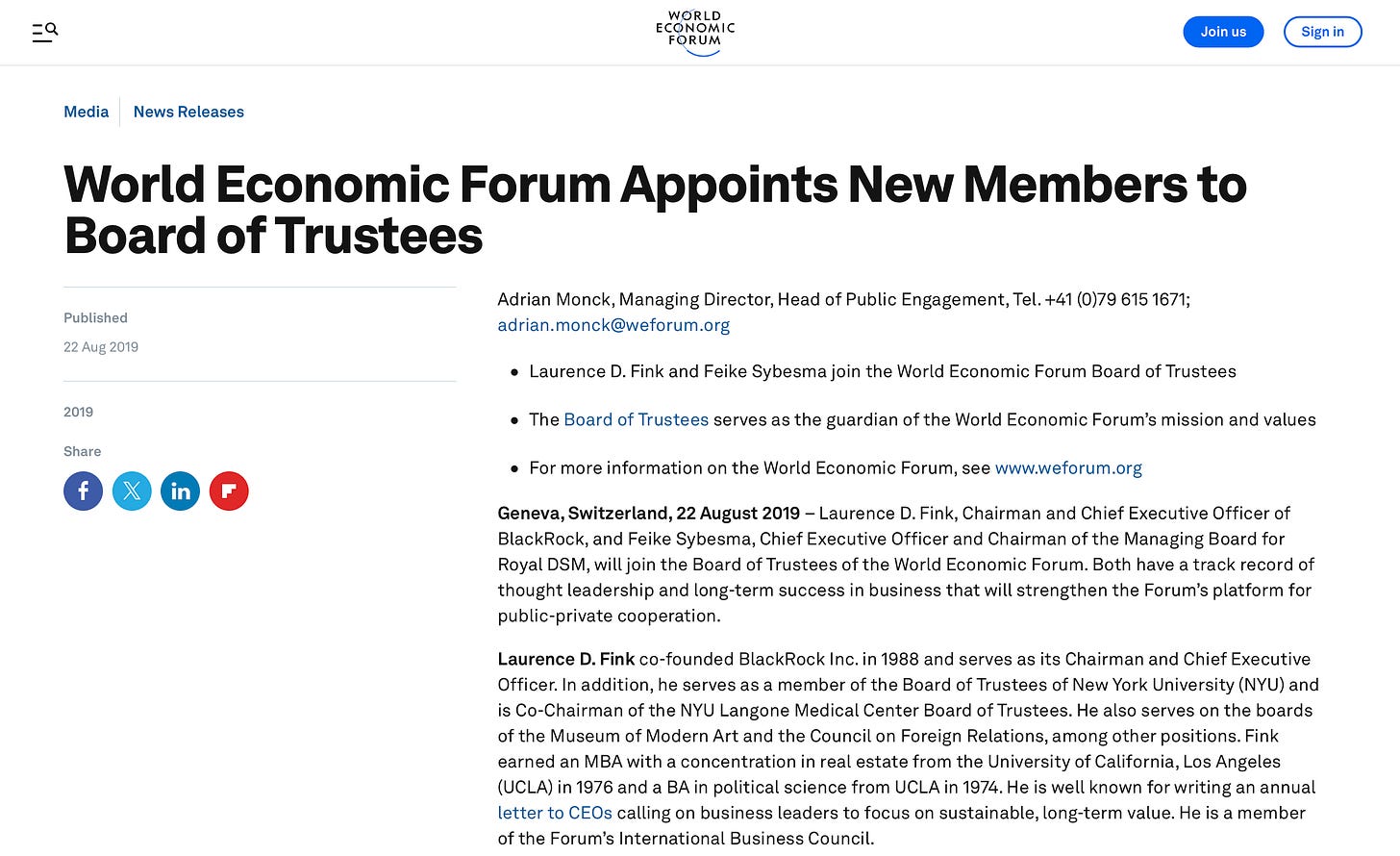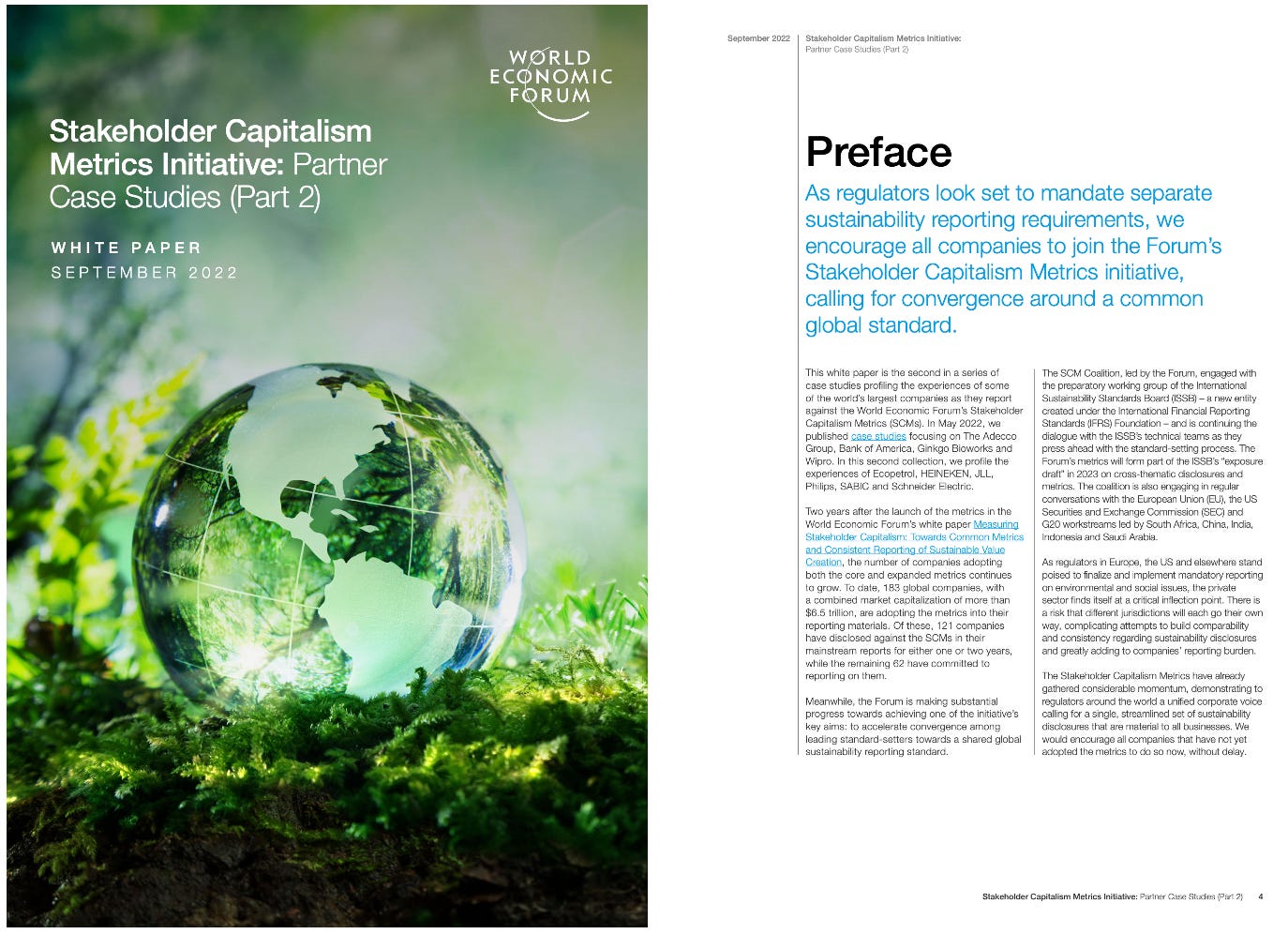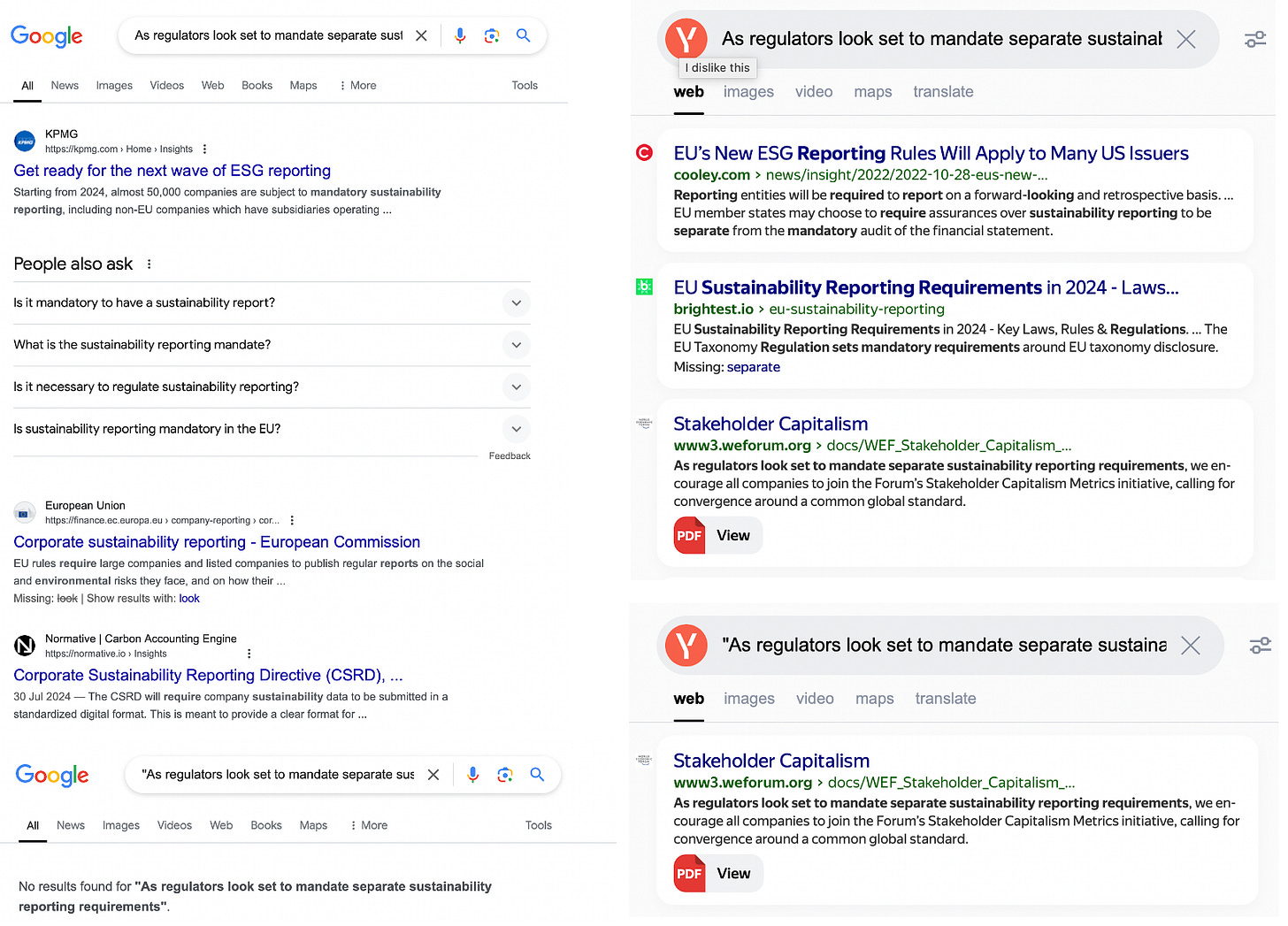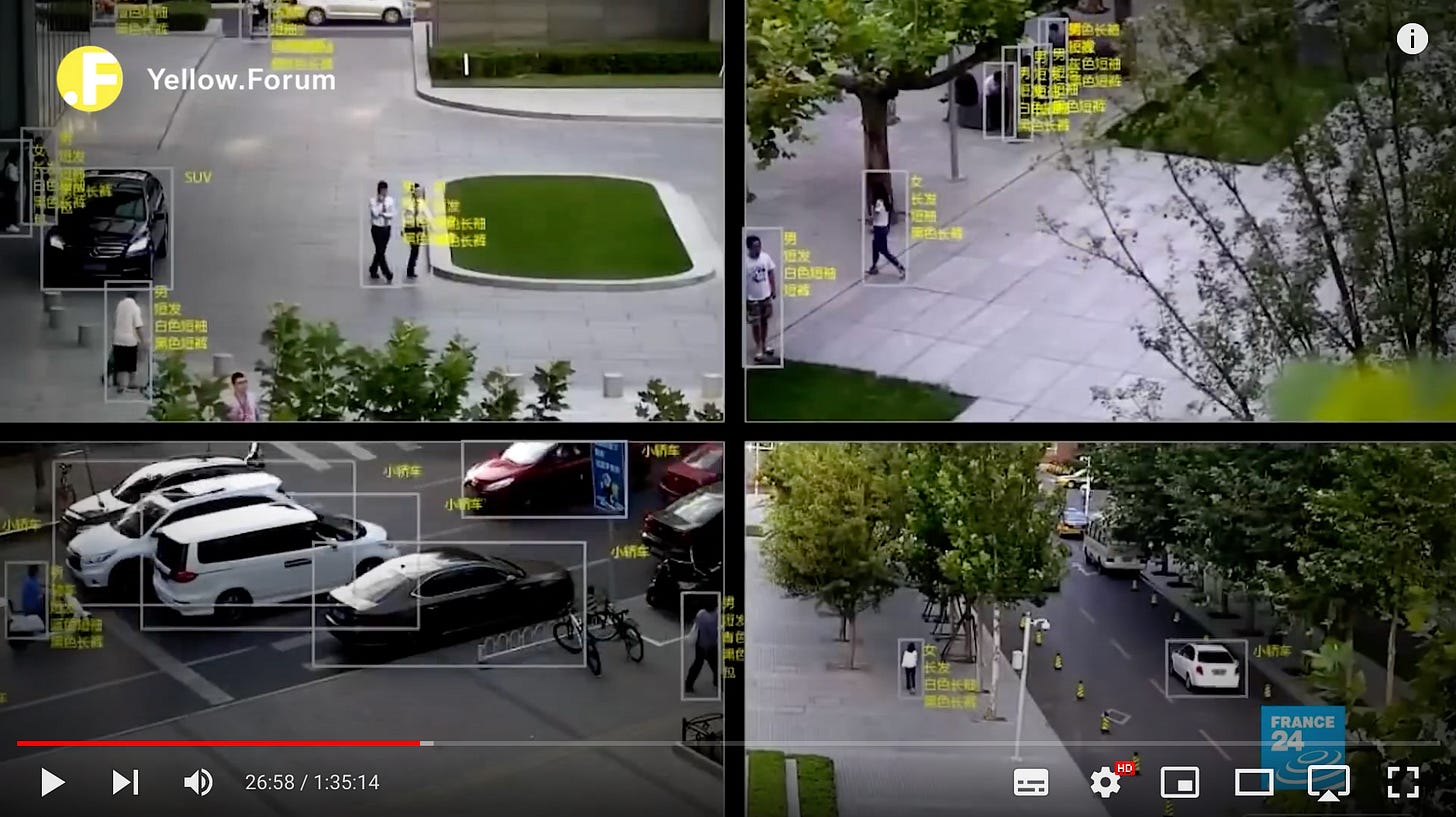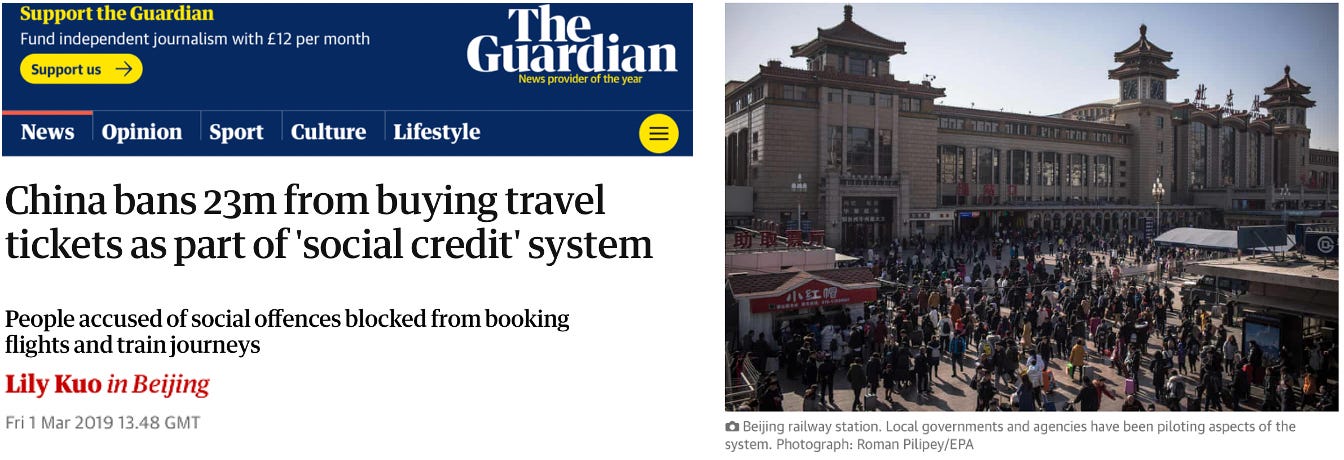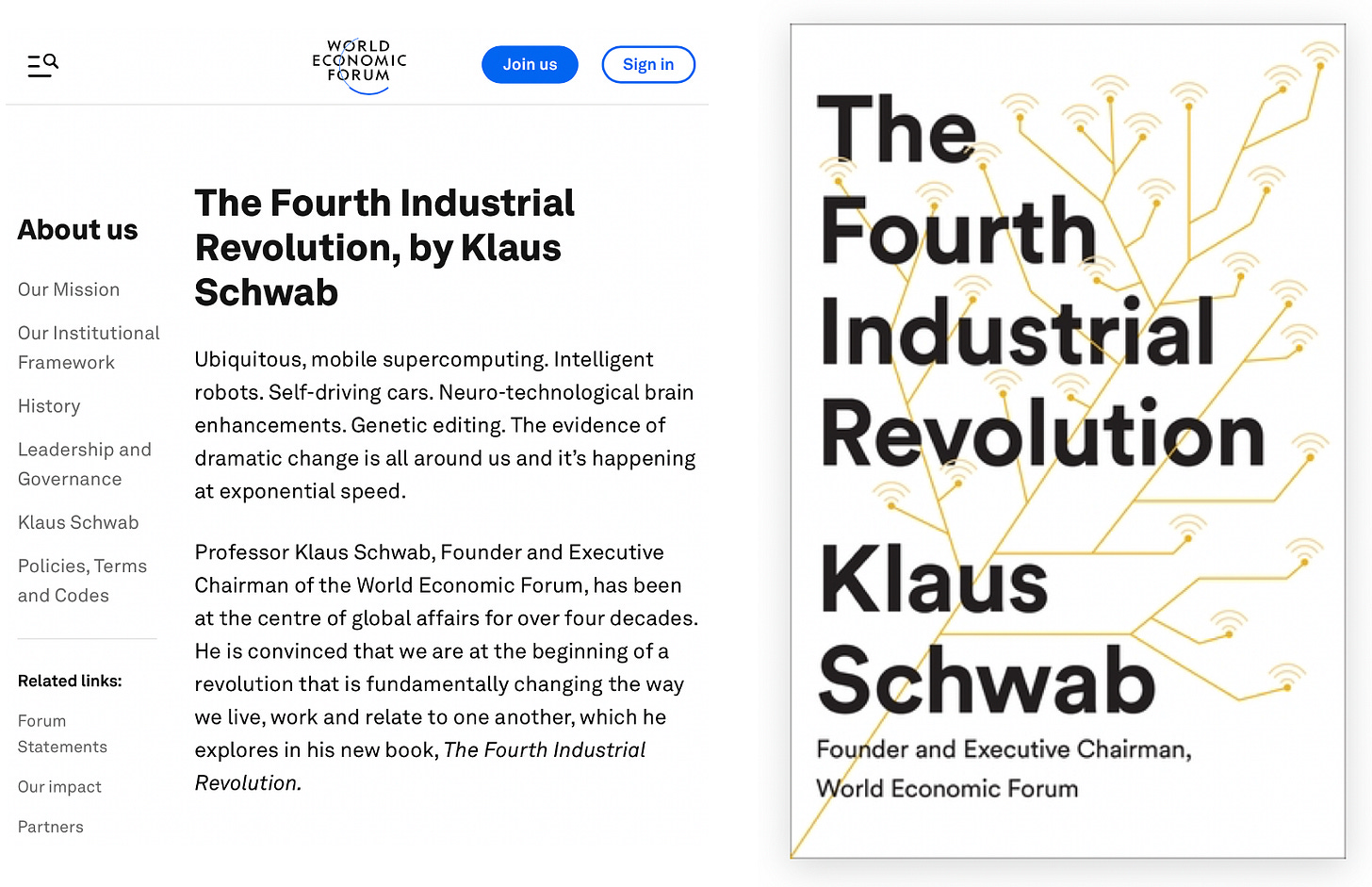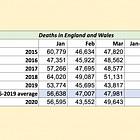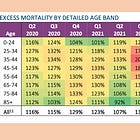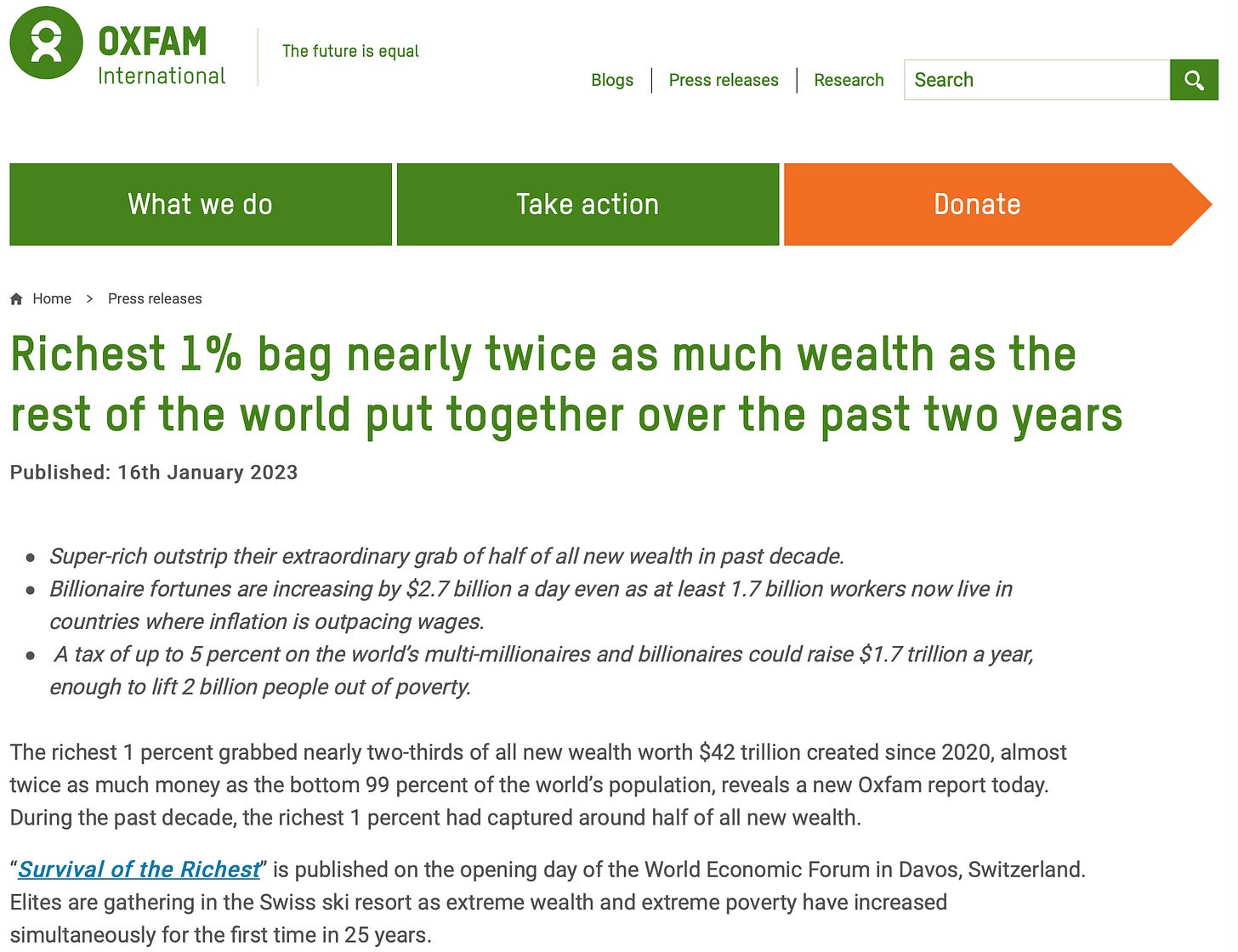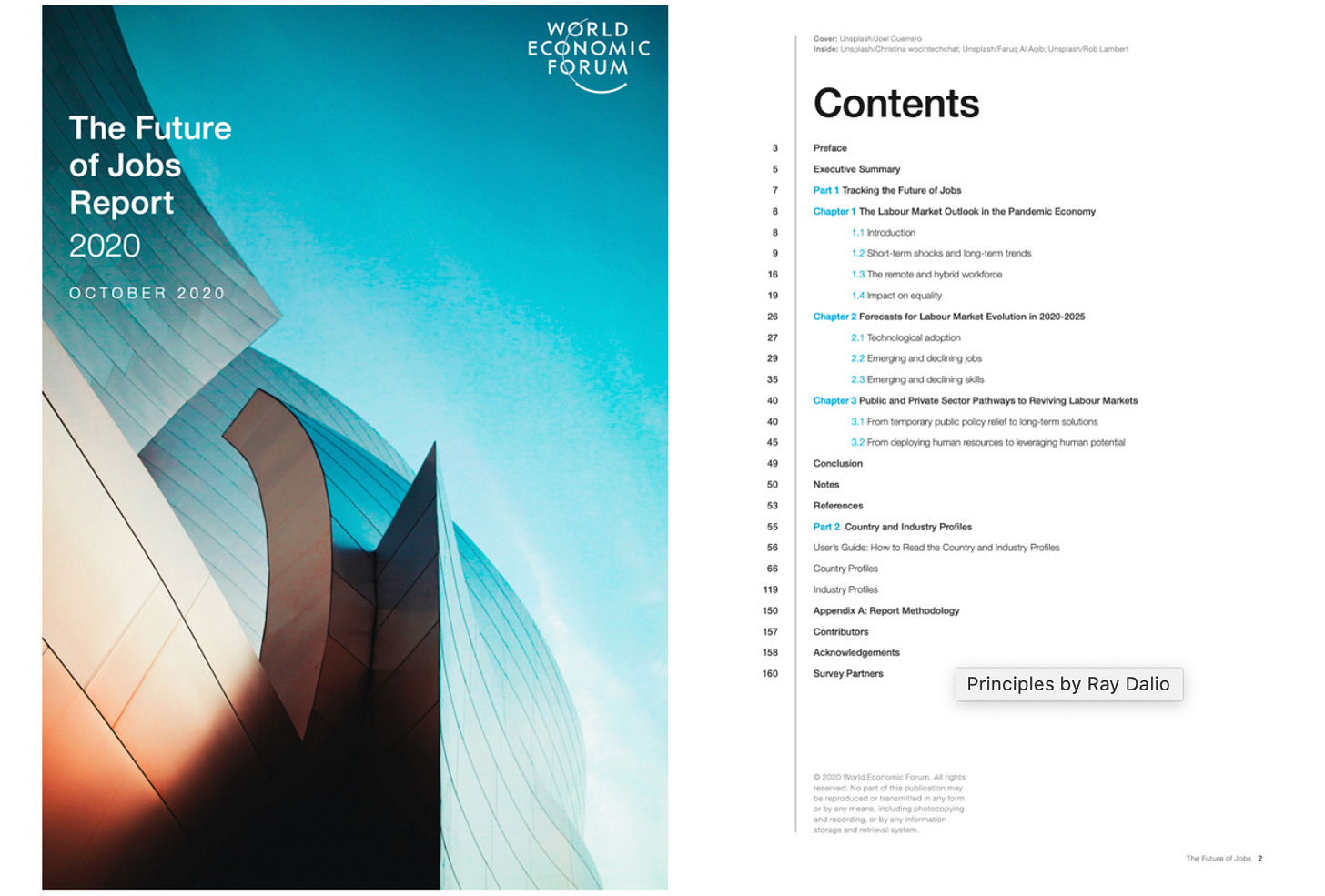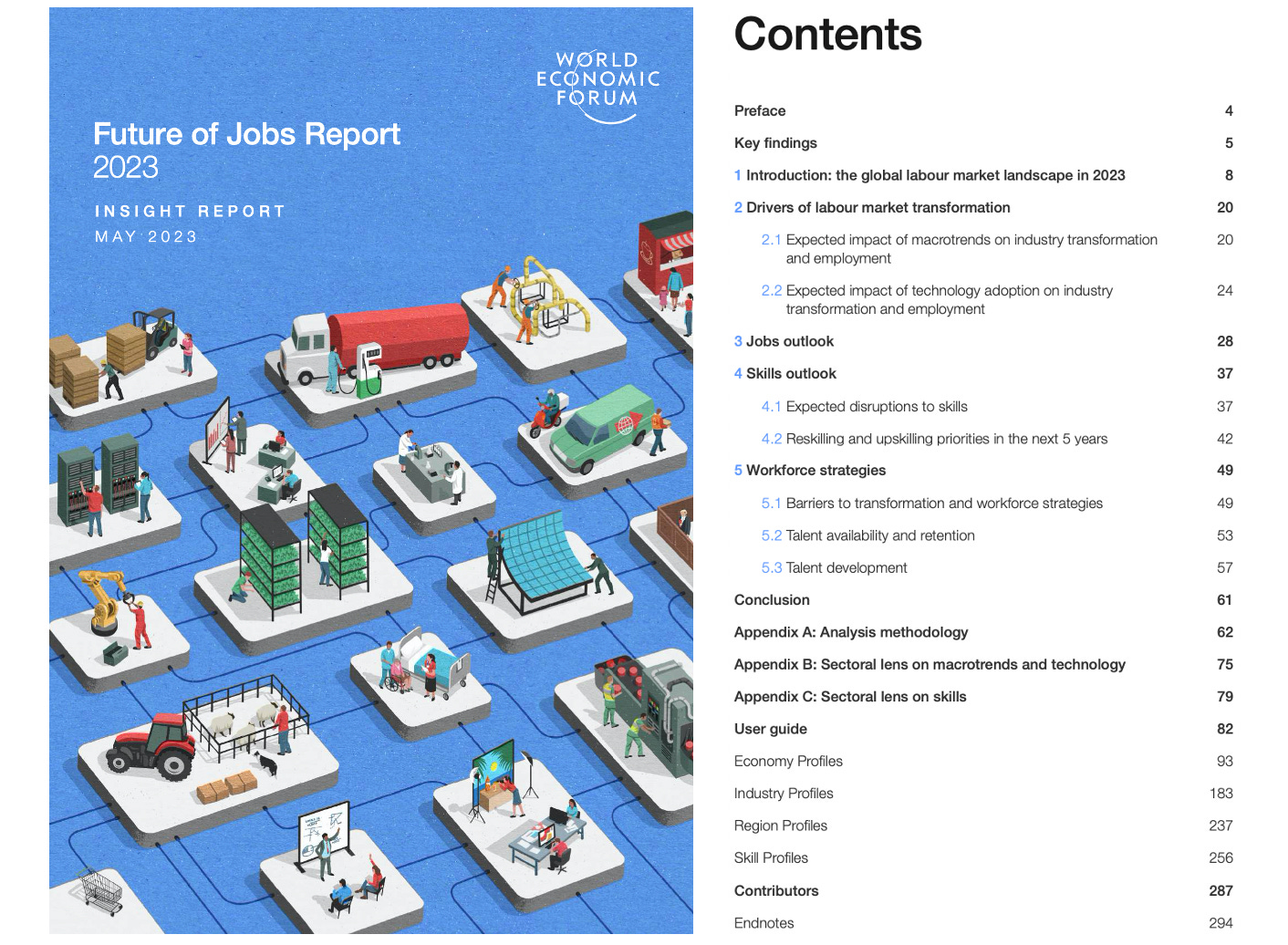Stakeholder Communism? (part 2 of 4)
A social credit system for companies; a social credit system for individuals; the jobs reset
Dear Church Leaders (and everyone else)
This is part 2 of a four-part article based on the documentary Stakeholder Communism.
Before reading this post, I recommend reading part 1…
…and particularly the introductory comments.
A social credit system for companies
ESG: Environmental, Social, and Governance
Environmental Social Governance (ESG) — essentially a corporate social credit score — is being used to facilitate the transition to stakeholder capitalism.
As Schwab puts it:
The stakeholder concept — and particularly the ESGs — are a very important part of getting business involved.
Environmental: complying with “sustainable” climate change restrictions
Social: complying with “inclusive” policies, requiring employment of more “oppressed” people and supporting social justice movements
Governance: i.e. corporate governance by “stakeholders” who govern us
Big companies
In order to receive a good score, big companies have been hiring “ambassadors” from “oppressed” groups for their advertising campaigns:
And companies such as BlackRock, the largest money management firm in the world, focus their investments in companies with good ESG scores:
In 2019, Larry Fink, the co-founder, chairman and CEO of BlackRock was appointed as a WEF trustee:
He is on record as stating that:
At Black Rock we are forcing behaviours… if you don’t force behaviours — whether it’s gender or race — you’re going to be impacted, and we’re going to have to force change
By starving non-compliant companies of funding, stakeholders such as BlackRock are forcing companies to adopt stakeholder capitalism.
One of the few prominent figures pushing back is Elon Musk:
That’s right, this Elon Musk:
Hmm.
If the WEF are setting themselves up as a one-world government…
…then Musk seems to be styling himself as Leader of the Opposition!?
All companies
According to this 2022 WEF white paper, in the context of “sustainability reporting requirements” all companies are being “[encouraged] to join the WEF’s Stakeholder Capitalism Metrics initiative”:
This has been led by the UK and former Prime Minister Rishi Sunak:
Incidentally, the above white paper was not easy to find. I searched this phrase from it…
“As regulators look set to mandate separate sustainability reporting requirements”
…but I didn’t find it on Google1 (or DuckDuckGo, Mojeek, Brave or Freespoke) — only Yandex(!) With the phrase in inverted commas, Yandex found the document (and only the document). Google returned no results.
This pattern is similar to that described in this post:
A social credit system for individuals
The next section describes the Chinese social credit system:
The state will go over every detail of a person’s life with a fine-tooth comb: financial situation. Spending habits, career, even behaviour on social media. Criticising the government online is a no-no.
As with the ESG score, the Chinese social credit system forces compliance by punishing people who break the government’s rules.
People considered untrustworthy by the government have their details — even their addresses — plastered across screens e.g. at cinemas.
People with a low social credit score are banned from travelling.
The social credit score is used coercively to influence behaviour. According to this report, “if you’re a soldier in China, applying to leave the army is likely to leave a black mark on your social credit score.”
Investigative journalist Liu Hu, who was uncovering corruption among high-profile Chinese Communist Party (CCP) members, comments:
Once you’re blacklisted, you can no longer get a bank loan, start a business, buy an apartment, or even send your children to a private school
There is also the context of the deaths of tens of millions of people in China under Communist governments during the past century:
Between 1960 and 1962, 30 million people died from starvation during the so-called “Great Leap Forward”. During China’s 10-year shift to Communism from 1966, Mau indoctrinated the young working class to rise up and attack anyone who favoured capitalism, resulting in millions murdered.
In 1989, thousands of human rights protesters were massacred by tanks and heavily armed troops in Tiananmen Square.
The oppression continues today. Chinese President Xi Jinping is leading an Orwellian campaign of control and intimidation using the media to brainwash citizens. Journalists are being arrested, and newspapers forced to censor or close down.
Religion is a particular target:
Due to the Marxist ideology opposing all forms of religion, over one million Uyghurs and other Chinese Muslims are currently being tortured — and often killed — in re-education camps designed to erase religion throughout China.
A BBC video states that:
Lessons are watched over by police carrying shields, batons and handcuffs. And… documents describe the response to students who attempt to escape — if warning shots are ignored, the order is clear: shoot them dead.
A CNN report features Jiang, a Chinese whistleblower who exposed the torture of Chinese prisoners:
Men and women… kick them, beat them bruised and swollen, knock their heads on the radiator. Police would step on the suspect’s face and tell him to confess…
And that is far from the worst of it, either in the Yellow Forum video or in the original CNN exposé from 2021.
For many Chinese prisoners of conscience, torture and the risk of being murdered is more preferable than the punishment for confessing to the crime of having a religious belief. According to the video, one man was sentenced to 16 years in jail just for growing a beard. Many others have been jailed for listening to illegal religious lectures. And their children are sent to state-run boarding schools built alongside the detention camps.
Remarkably, one former victim testifies that he can forgive the men who jailed and tortured him:
I don’t hate them, because all of them [are victims] of that system
In Communist China, it seems it has been relatively straightforward for the State to introduce social credit. In the West, such a system would meet with considerable opposition. And so it appears that the WEF strategy is to bring in social credit (via ESG) for big companies first, and then to extend it — first to all companies, and then, we may reasonably presume, to individuals.
The jobs reset
Some important context for what we are currently seeing is what Schwab describes as “the fourth industrial revolution” in another of his books:
…artificial intelligence, the Internet of Things, cloud-computing, advanced robotics and many other [things]… the Fourth Industrial Revolution has become a reality…
…it’s coming like a tsunami, it will be overwhelming to see how fast the change will happen in an exponential speed… drones, robots, artificial intelligence, this technological revolution changes how we consume how we produce how we organise our supply chains. It changes us. Just think of sensors planted into our brains…
…I’m convinced that we will destroy — unfortunately — a lot of employment. Just think of… self-guided cars and all the drivers losing their jobs…
Our life in 10 years from now will be completely different and [he] who masters those technologies will be the master of the world.
I detect more than a hint of the spirit of Babel as discussed in this recent post, which is (to my mind) a contender for the most important piece I have written in terms of beginning to understand where we are:
The fear is that if/when artificial intelligence (AI) takes many jobs, wealth will shift to the corporate stakeholders who own the machines…
…making many people desperate, dependent and more vulnerable to tyranny.
And that there will be an erosion of the lower middle class, which will eventually affect most of us — and particularly younger people.
It is worth bearing in mind that previous industrial revolutions that resulted in jobs being lost also led to new ones being created, and it remains to be seen what will happen in the “fourth industrial revolution” with the advent of artificial intelligence (AI). But there are certainly grounds for concern.
What is more concerning though is that the changes have been accelerated in the last few years, starting in 2020, when WEF-affiliated politicians…
…announced the closure of “non-essential” businesses under the pretext of protecting their citizens from a supposedly deadly respiratory virus…
…while large corporations were allowed to continue trading much as usual, resulting in the permanent closure of many small businesses.
This would have been bad enough if there had actually been a substantial risk to health. But a brief, sober and objective look at the official figures from 2020 tells us that deaths were no higher than normal prior to the introduction of “covid measures”, despite the fact that covid had been circulating for at least two months.
The inconvenient truth is that the death rate increased only after the first lockdown began and the “covid response” began. When people panicked. When people were terrified by their governments. When people were told, “Don’t come into hospital if you can help it.”
Moreover, it seems beyond doubt from US life insurance data that many of the excess deaths from late 2020 onwards were caused not by a virus but by the injections that were meant to protect people from that virus (which in any case hadn’t actually caused more people to die when it was circulating prior to “covid measures” being introduced):
The “covid measures” resulted in an unprecedented transfer of wealth from the poor to the rich. Here is an Oxfam report from 2023:
In 2020 the WEF published this document, The Future of Jobs Report:
Its Executive Summary (p5) begins by saying that:
The COVID-19 pandemic-induced lockdowns and related global recession of 2020 have created a highly uncertain outlook for the labour market and accelerated the arrival of the future of work.
And according to section 1.1 (p9):
In economies riddled with inequalities and sluggish adaptation to the demands of the new world of work, there is an ever-larger need for a ‘Great Reset’, which can herald opportunities for economic prosperity and societal progress through good jobs. [Emphasis added]
And four months after the announcement of covid lockdowns in March, Klaus Schwab’s book COVID-19: The Great Reset (co-authored with Thierry Malleret) was launched:
I wonder when the book was actually written.
In June 2021, the WEF held “The Jobs Reset Summit”:
Welcome back to the Great Reset on Day 1 of The Jobs Reset Summit which is being held as covid-19 is not only wiping out jobs but also changing the way millions of us work…
And around the same time the WEF’s Managing Director Saadia Zahidi declared a jobs crisis on The Great Reset podcast:
In the last few years I think we’ve seen the growing threat of technology to jobs. By 2025, humans and machines will be at par in terms of how those tasks are being divided. About half of their employees will need reskilling. In every single job there is the expectation that at least 40% of the core skills in that job are going to change. Now that is a massive number for most of us to absorb. It basically means that roughly half of what we’re doing is going to look different in terms of the tasks that we do day to day.
In 2023, as they were still benefiting from the lockdowns, the stakeholders discreetly published the Future of Jobs Report:
According to the Executive Summary:
The COVID-19 pandemic-induced lockdowns and related global recession of 2020 have created a highly uncertain outlook for the labour market and accelerated the arrival of the future of work.
That same Executive Summary recommends, among other things, that:
Companies need to invest in better metrics of human and social capital through adoption of environmental, social and governance (ESG) metrics and matched with renewed measures of human capital accounting. A significant number of business leaders understand that reskilling employees, particularly in industry coalitions and in public-private collaborations, is both cost-effective and has significant mid- to long-term dividends — not only for their enterprise but also for the benefit of society more broadly. Companies hope to internally redeploy nearly 50% of workers displaced by technological automation and augmentation, as opposed to making wider use of layoffs and automation-based labour savings as a core workforce strategy. [Emphasis added]
The inconvenient truth is that the “jobs reset” was significantly accelerated by the “covid measures” that were implemented in the context of people dying at a rate that was no different from any other year.
To be continued…
[Update: Link to part 3]
Dear Church Leaders Archive; some posts, including a version of this one, can also be found on Unexpected Turns
The Big Reveal — Christianity carefully considered
I didn’t see the document in the first ten pages of results






